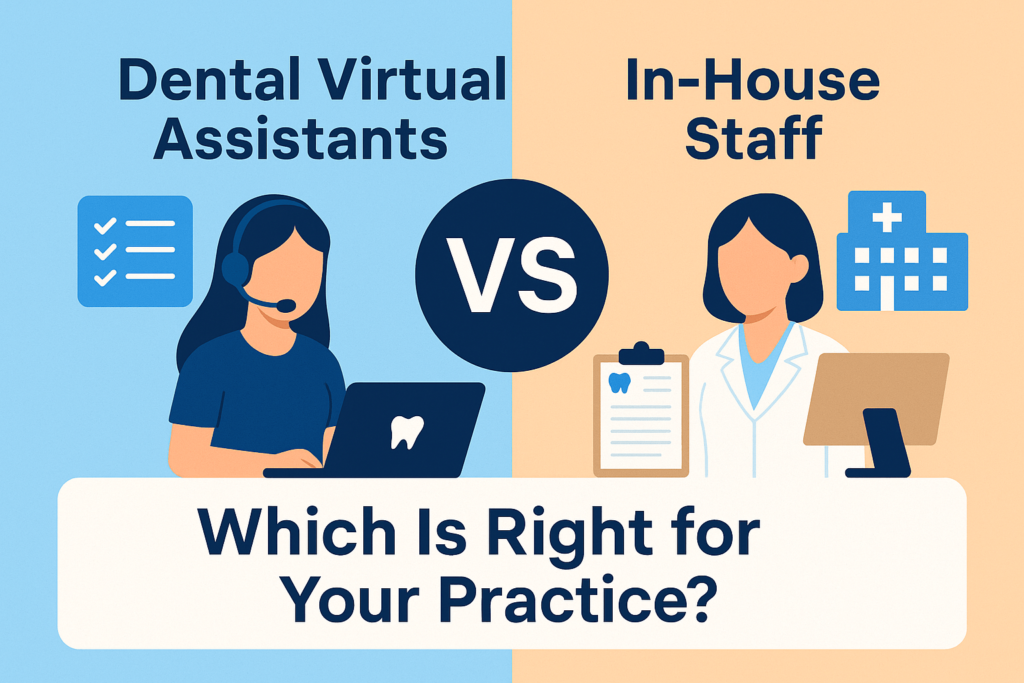In today’s fast-paced dental landscape, managing the clinical side of care is only part of the equation. Behind every thriving practice is an efficient administrative team — answering calls, confirming appointments, verifying insurance, and ensuring billing runs smoothly.
But as operational demands grow and hiring challenges mount, many dental professionals are asking an important question:
Should you stick with traditional in-house front desk staff, or is it time to bring in a dental virtual assistant?
Let’s break down both options — side by side — so you can make the best decision for your practice’s workflow, patient satisfaction, and long-term profitability.
What Is a Dental Virtual Assistant?
A dental virtual assistant (DVA) is a trained remote professional who provides non-clinical administrative support to dental practices. Unlike general virtual assistants, DVAs are typically familiar with dental-specific tasks, tools, and regulations.
Common responsibilities include:
- Patient appointment scheduling and follow-ups
- Insurance eligibility verification
- Claims submission and billing assistance
- Answering inbound calls or managing online chats
- Managing treatment reminders and recalls
- Dental software support (Dentrix, Eaglesoft, Open Dental, etc.)
Because they work off-site, dental virtual assistants provide flexible, cost-effective coverage without the overhead of hiring in-house.
In-House Front Desk Staff: The Traditional Model
In-house team members have long been the backbone of dental offices. They greet patients, manage the front desk, and assist with a wide range of administrative tasks.
Advantages of In-House Staff
- Face-to-Face Engagement: Personal greetings help foster relationships and a warm patient experience.
- Physical Presence: Handling paperwork, collecting payments, and managing waiting rooms are done in real time.
- Team Dynamics: Internal staff can build a tight-knit team culture and handle last-minute needs.
Limitations
- High Overhead: Full-time salaries, taxes, training costs, PTO, and benefits can stretch a dental practice’s budget.
- Staff Turnover: Replacing trained staff is time-consuming and expensive — and impacts patient satisfaction.
- Limited Hours: Coverage usually aligns with office hours, leaving gaps during evenings, weekends, or emergencies.
Dental Virtual Assistants: A Scalable Alternative
Virtual dental assistants offer a modern, flexible solution to staffing shortages and rising costs. With many practices operating in hybrid or fully digital workflows, outsourcing front desk support is easier and more secure than ever.
Advantages of Virtual Dental Assistants
- Cost Efficiency: Pay for only what you need — no benefits, no payroll taxes, no workspace required.
- Specialized Skills: Many DVAs are pre-trained in dental software and administrative protocols.
- Scalable Support: Add or reduce hours based on volume — perfect for seasonal demands or practice growth.
- Extended Coverage: Some virtual assistant services offer evening and weekend availability for improved responsiveness.
- Focus on Patient Care: By offloading admin tasks, in-house staff can devote more energy to in-office patient experience.
Limitations
- Lack of Physical Presence: DVAs can’t handle in-office tasks like greeting walk-ins or collecting payments at the front desk.
- Tech Dependency: Reliable internet, secure communication tools, and cloud-based systems are essential.
- Less Face Time with Team: Remote workers won’t be part of daily office culture — which may impact bonding or team dynamics.
Side-by-Side Comparison
| Feature | In-House Staff | Dental Virtual Assistant |
|---|---|---|
| Personal, face-to-face interaction | ✅ Yes | ❌ No |
| Handles physical tasks (paperwork, payments) | ✅ Yes | ❌ No |
| Cost-effective for growing practices | ❌ High Overhead | ✅ Lower Cost |
| Scalable based on need | ❌ Rigid | ✅ Highly Flexible |
| Available after hours or weekends | ❌ Limited | ✅ Often Available |
| Familiarity with dental software | ✅ Yes (with training) | ✅ Pre-trained |
| HIPAA-compliant remote systems | ❌ Not always guaranteed | ✅ Yes (with vetted providers) |
When to Choose a Virtual Dental Assistant
A virtual dental assistant might be the right fit for your practice if:
- You’re a solo practitioner or small team trying to reduce overhead
- You’ve experienced frequent front desk turnover or absenteeism
- You need support during evenings, weekends, or high-demand seasons
- Your in-house team is overwhelmed and needs backup with insurance verification, recalls, or claims
- You’re looking to scale operations without hiring full-time staff
Hybrid Models: The Best of Both Worlds?
Some forward-thinking dental offices are adopting a hybrid staffing model:
- In-house team members handle in-office interactions and walk-ins
- Virtual dental assistants manage backend tasks like billing, scheduling, or insurance calls
This allows for maximum efficiency while keeping the patient experience personal.
Watch Out for These Common Assumptions
Let’s challenge a few assumptions that could lead practices to ignore virtual dental assistant services:
“Remote workers can’t be as effective.”
→ Reality: With the right systems (cloud-based EHR, VoIP phones, secure portals), virtual assistants can be just as — or more — efficient than in-house staff.
“Patients prefer speaking to someone in the office.”
→ Reality: Most patients care more about speed and accuracy than location. A well-trained dental virtual receptionist can provide excellent service from anywhere.
“Only large practices need virtual help.”
→ Reality: Smaller offices benefit the most — by trimming overhead and freeing up time for clinical work.
Final Verdict: It’s About Strategy, Not Size
At the end of the day, the best staffing model for your dental practice comes down to your goals, budget, and workflow. Virtual dental assistants aren’t a replacement for every role — but they are an increasingly valuable asset in today’s hybrid healthcare environment.
Whether you’re trying to cut costs, extend hours, or lighten the admin load on your team, dental virtual assistant services can give you the flexibility and efficiency modern practices demand.








Leave a Reply